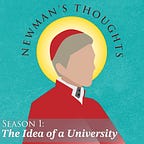Reading for Day 26: The Idea of a University, Discourse III, Bearing of Theology on Other Branches of Knowledge § 4
Complete Recording of Discourse III @ Catholic Culture Audiobooks
Paperback with Introduction by Dr. Don Briel available @ Cluny Media
Full online text of The Idea of a University and other works by St. John Henry Newman are available @ the National Institute for Newman Studies’ Newman Reader
Summing up, Gentlemen, what I have said, I lay it down that all knowledge forms one whole, because its subject-matter is one; for the universe in its length and breadth is so intimately knit together, that we cannot separate off portion from portion, and operation from operation, except by a mental abstraction; and then again, as to its Creator, though He of course in His own Being is infinitely separate from it, and Theology has its departments towards which human knowledge has no relations, yet He has so implicated Himself with it, and taken it into His very bosom, by His presence in it, His providence over it, His impressions upon it, and His influences through it, that we cannot truly or fully contemplate it without in some main aspects contemplating Him. Next, sciences are the results of that mental abstraction, which I have spoken of, being the logical record of this or that aspect of the whole subject-matter of knowledge. As they all belong to one and the same circle of objects, they are one and all connected together; as they are but aspects of things, they are severally incomplete in their relation to the things themselves, though complete in their own idea and for their own respective purposes; on both accounts they at once need and subserve each other. And further, the comprehension of the bearings of one science on another, and the use of each to each, and the location and limitation and adjustment and due appreciation of them all, one with another, this belongs, I conceive, to a sort of science distinct from all of them, and in some sense a science of sciences, which is my own conception of what is meant by Philosophy, in the true sense of the word, and of a philosophical habit of mind, and which in these Discourses I shall call by that name. This is what I have to say about knowledge and philosophical knowledge generally; and now I proceed to apply it to the particular science, which has led me to draw it out.
I say, then, that the systematic omission of any one science from the catalogue prejudices the accuracy and completeness of our knowledge altogether, and that, in proportion to its importance. Not even Theology itself, though it comes from heaven, though its truths were given once for all at the first, though they are more certain on account of the Giver than those of mathematics, not even Theology, so far as it is relative to us, or is the Science of Religion, do I exclude from the law to which every mental exercise is subject, viz., from that imperfection, which ever must attend the abstract, when it would determine the concrete. Nor do I speak only of Natural Religion; for even the teaching of the Catholic Church, in certain of its aspects, that is, its religious teaching, is variously influenced by the other sciences. Not to insist on the introduction of the Aristotelic philosophy into its phraseology, its explanation of dogmas is influenced by ecclesiastical acts or events; its interpretations of prophecy are directly affected by the issues of history; its comments upon Scripture by the conclusions of the astronomer and the geologist; and its casuistical decisions by the various experience, political, social, and psychological, with which times and places are ever supplying it.
What Theology gives, it has a right to take; or rather, the interests of Truth oblige it to take. If we would not be beguiled by dreams, if we would ascertain facts as they are, then, granting Theology is a real science, we cannot exclude it, and still call ourselves philosophers. I have asserted nothing as yet as to the pre-eminent dignity of Religious Truth; I only say, if there be Religious Truth at all, we cannot shut our eyes to it without prejudice to truth of every kind, physical, metaphysical, historical, and moral; for it bears upon all truth. And thus I answer the objection with which I opened this Discourse. I supposed the question put to me by a philosopher of the day, "Why cannot you go your way, and let us go ours?" I answer, in the name of the Science of Religion, "When Newton can dispense with the metaphysician, then may you dispense with us." So much at first sight; now I am going on to claim a little more for Theology, by classing it with branches of knowledge which may with greater decency be compared to it.




